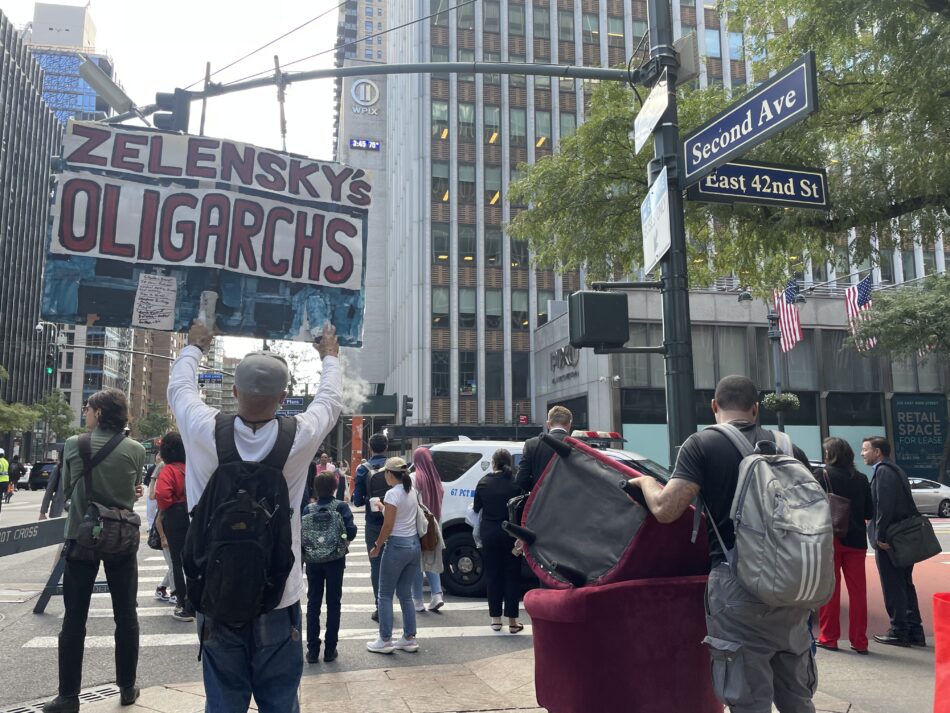Many New Yorkers question President Joe Biden’s choice to maintain support for Ukraine during the ongoing humanitarian crisis, suggesting that the funds allocated to Ukraine could be better utilized to aid American citizens in need.
“It’s important for the U.S. to help countries that are in difficult situations or humanitarian crises like Ukraine, but they have to put our own people first,” said Fernando Costa of Jackson Heights. Costa voiced a sentiment shared by many other New Yorkers: the belief that the United States should focus on addressing its domestic issues before aiding other countries facing humanitarian crises.
On Tuesday morning, President Biden delivered an address at the United Nations General Assembly. He discussed various topics, including the climate crisis, artificial intelligence regulations, and the U.S.-China relationship. Towards the end of his speech, Biden reiterated the unwavering support of the United States for Ukraine amidst the ongoing humanitarian crisis.
Biden cautioned that Russia holds the belief that prolonged warfare will lead to a decline in international support and assistance for Ukraine. “No nation wants this war to end more than Ukraine,” Biden remarked. “We strongly support Ukraine in its efforts to bring about a diplomatic resolution that delivers just and lasting peace. Russia alone bears responsibility for this war.”
Despite the roar of applause that echoed through the United Nations General Assembly following Biden’s speech, there are lingering doubts among many New Yorkers regarding the choice of the United States to prioritize ongoing support for Ukraine.
Since the onset of Russia’s invasion of Ukraine in February 2022, the United States has provided over $66 billion in military, humanitarian, and financial aid to Ukraine. The White House has since requested an additional $24 billion to further assist Ukraine in its ongoing battle against Russia.
When asked if the United States has a responsibility to help other countries facing humanitarian crises such as that of Ukraine, New York City resident Loanis Espinoza responded, “To the extent that Biden is doing it, no, I don’t think so”. She expanded on her viewpoint, stating, “I mean look at New York City, Biden won’t give money to the mayor here to try and deal with this migrant crisis, so now all our services are getting cut, but yet he is able to send billions to Ukraine”.
Espinoza was referring to a recent appeal made by New York City Mayor Eric Adams in August to the federal government. The appeal sought federal aid to cover the $12.2 billion spent on accommodating the influx of more than one hundred thousand asylum-seeking immigrants that arrived in New York City from the southern border.
“New Yorkers did not create an international humanitarian crisis. But our city’s residents have been left to deal with this crisis almost entirely on our own,” Adams emphasized during an address on August 9th.
The ongoing migrant crisis in New York City has received minimal attention from the President and the federal government as a whole. During the same August 9th address, Adams expressed the urgent need for assistance, declaring, “While New York City will continue to lead, it’s time the state and federal government step up.”
Amid this crisis and lack of federal assistance, many New Yorkers like Espinoza find it challenging to comprehend President Biden’s decision to allocate additional federal funding to the humanitarian crisis in Ukraine.
Paul Noaba, an immigrant from Guatemala residing in New York City, voiced this challenging perspective shared by many residents. While acknowledging the significance of the crisis in Ukraine, he questioned whether it takes precedence over the issues within the United States. “I really don’t know how to solve the issue in Ukraine because it is a very big problem, yet we are seeing problems unsolved here every day,” said Noaba.
In the months ahead, the Biden administration’s management of the migrant crisis will likely weigh heavy on the minds of many New Yorkers as they prepare to cast their votes next fall.


